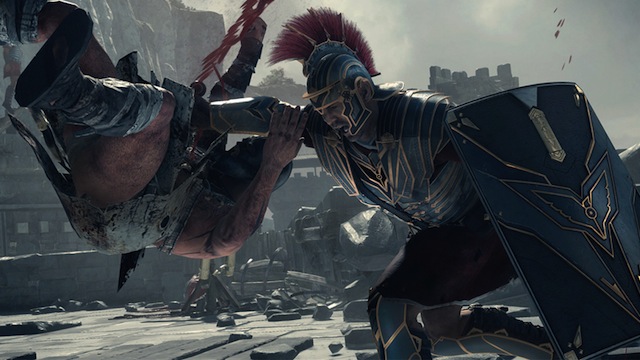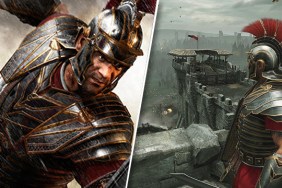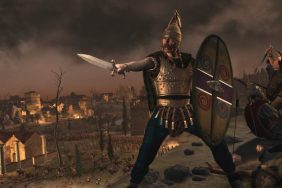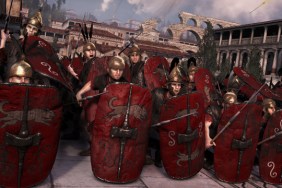Friends, Romans, countrymen, lend me your ears… literally.
Rome is burning. As Roman Centurions do what they do best—kill the enemy in nasty, nasty ways with gladius swords—Emperor Nero cowers in his vault with General Marius Titus as he hopes the big, beefy man will save him from impending doom. Not exactly. You see, Marius has a story to tell Nero, and he's going to tell it even though his men are out in the Forum fighting a very bloody battle. I had always heard that Nero fiddled while Rome burned; in this game, he gets bored to death instead.
And yes, it is this story that the player goes through in Ryse: Son of Rome—everything Marius has gone through since the moment he joined the mighty Roman army. Marius serves under the 14th with Commander Vitallion, because Britons killed Marius' family and Vitallion just so happens to be in charge of relegating Rome's stake in Britannia. There's nothing like a revenge story to get one heated up for battle.
Historically, Rome was never fully able to conquer Britannia. The tribal clansmen never ceased rebelling against the Romans to the point that when the emperor decided it wasn't worthwhile to stay, he didn't even help the consul evacuate the country. So Vitallion's command post wasn't exactly a fortunate one for him. While this setting of hatred in Britannia is present in Ryse, the game twists history here a little bit for the sake of the story. The rebellion during Nero's time was indeed led by a woman named Boudica, as is the case in the game, but Boudica did not invade Rome herself. Boudica was also not the final push to get the Romans out of Britannia. But I know the game has to keep things a little interesting, so this Roman history nut was able to look past that part of it.
Interestingly enough, the game shows that the writers and developers really did their research with Roman history and even British history. At one point, Marius has to entangle with the Horned King, which is straight out of Welsh history and mythology. The Horned warriors even executed the captured soldiers using wicker baskets, also inherent in Welsh mythology and history.
Little touches like that made me smile a bit, but then other things showed that they either didn't completely do their research or they just didn't care. For example, this is about Rome and Roman soldiers, yet the characters used Greek names for the gods. The writers even took the Greek myth of the sword of Damocles and wrangled it to fit what they needed for their story of vengeance.
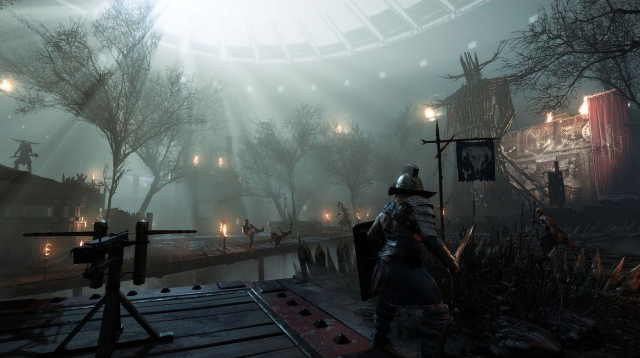
But then the writers actually scripted for one of the Roman soldiers to yell, "The Britons are coming! The Britons are coming!" as the Romans were trying to evacuate, which made me literally laugh out loud. I swear to you that if at any point when Marius was sailing to Britannia someone ordered "Ramming speed!", I would have given this game a perfect score on the spot.
Well, I would have wanted to, but the gameplay would have prevented me from doing so, as this is where Ryse does take quite a hit. The style does not deviate much from four types of combat, which though accurate for what Roman soldiers did in battle, doesn't mean that it is interesting to play. After about three to four hours of game time, you've pretty much experienced all the combat styles the game has to offer. At least the main campaign is short.
Hand-to-hand is the most prevalent form of combat. It seems at first that you can get away with simple button-mashing to get through it, but it's not long before you realize you need to be in control of which actions you're commanding with each button press. Mastering the timing of a perfect deflect becomes crucial, especially later in the game when the more powerful warriors make their grand appearances. As a lover of button-mashing hack-and-slash games, I was a little put off by the required perfection, but it grew on me.
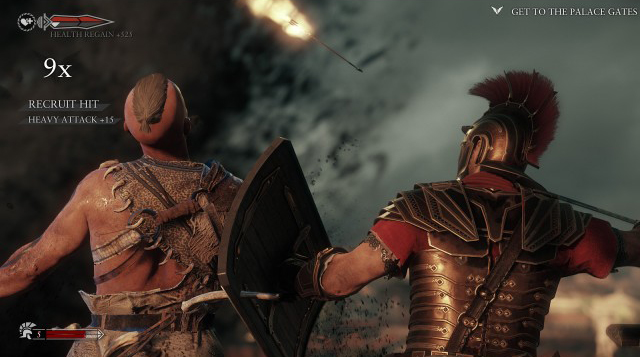
After you beat and slash an opponent into submission, Marius has the option to execute the enemy. With each execution, Marius can replenish his health (this is the only way to recover health), earn more experience with the kill, or earn more focus (when activated, focus slows down time for a short period). The executions themselves appear to be stylized quick-time events, but they really aren't, because failing to press the proper button does not fail the execution. The point in pressing the requested buttons is for bigger payout in which reward the player has chosen for the execution. In other words, failing the execution means getting a lower health bonus than you would by executing (pun intended) it perfectly.
Players can level up Marius's skills and style of his executions in two ways: with experience or with gold. Experience is earned only in the campaign, whereas gold can be acquired in two ways. Gold can be directly purchased with microtransactions, and gold can be won in the multiplayer gladiator arena.
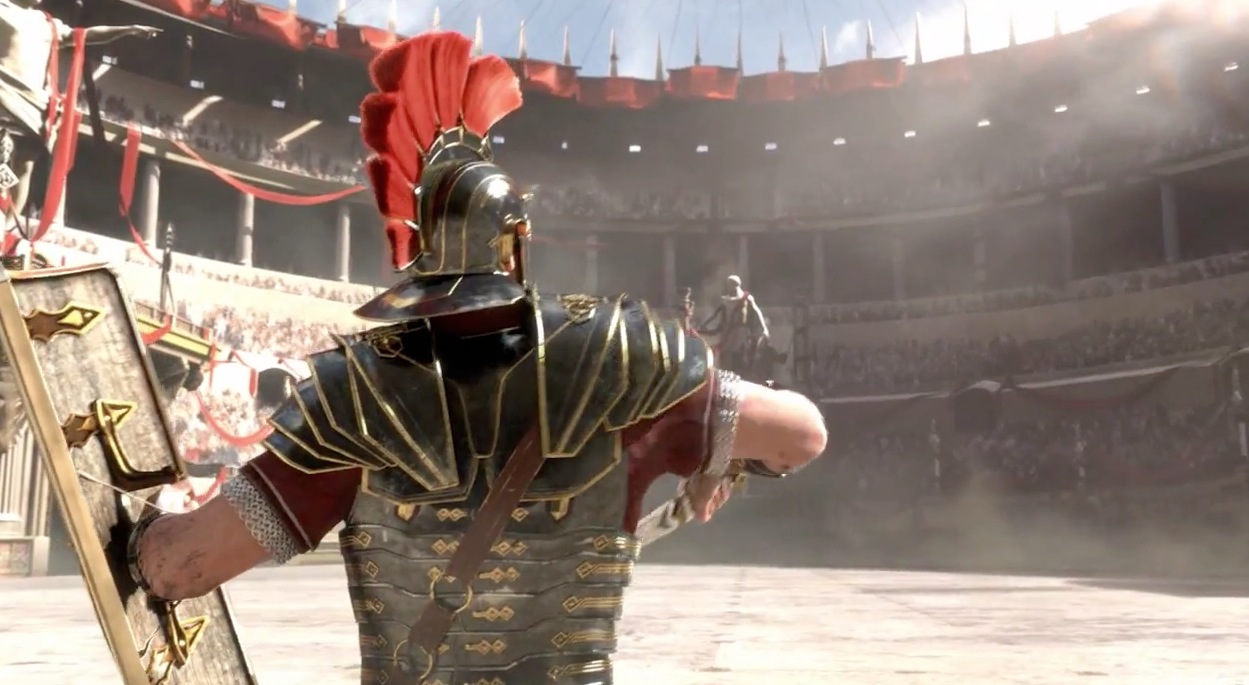
Gold is the only way to level up a gladiator in the arena and give the gladiator decent armor, so it is possible to max out your warrior from the beginning if you're willing to spend some cash. Some people were, and it was a bit disappointing to be trounced in the arena on game launch day by people who spent real money on the armor that would take several matches to win. The gladiator multiplayer matches themselves are okay, but while the hand-to-hand combat is tolerable in the campaign, it doesn't make for enticing multiplayer action for very long.
Ryse is an absolutely beautiful game, but all the beauty in the world can't make up for repetitive gameplay that will most likely bore the average gamer, even those who like hack-and-slash. The game is honestly kind of a guilty pleasure for me, but I know I'm a bit of rarity. The realistic portrayals of Roman combat satisfy me, and I greatly enjoy finding the proper combinations to smacking around Britons into execution mode. That said, I was quite ready for the campaign to be over when it was, which doesn't speak that highly for an Xbox One launch title that was supposed to have so much promise.
-
Stunning, breathtaking visuals
-
Short campaign
-
Typical revenge story
-
Fun hack-and-slash combat
-
Can change execution bonuses at any time for player's need
-
Only four styles of gameplay that repeat and repeat
-
Online multiplayer gladiator mode
-
Microtransactions unbalance multiplayer
